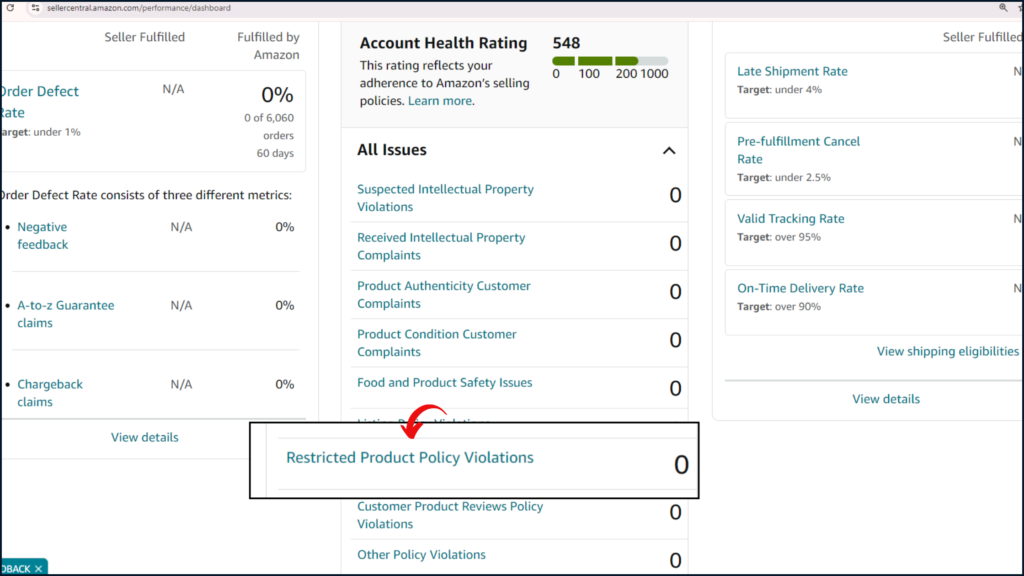Businesses can profit greatly from selling on Amazon, but some limitations and guidelines must be followed. Amazon’s policy framework is designed to ensure a fair marketplace, protect customer interests, and maintain the platform’s integrity. As a seller, adhering to these policies is crucial for maintaining your Amazon account health and ensuring your business’s long-term success.
This blog will explore the impact of policy violations on your Amazon account health and provide actionable steps for resolving and preventing these violations.
What Are Amazon’s Policies?
Types of Policies:
Sellers on Amazon are required to abide by a comprehensive set of policies, which are broadly classified into:
- Listing Policies: These govern how products should be listed on the platform, including rules about accurate descriptions, proper use of keywords, and compliant images.
- Seller Performance Policies: These focus on maintaining high standards for customer service, timely shipments, and overall seller performance.
- Intellectual Property Policies: By guaranteeing that sellers do not violate patents, copyrights, or trademarks, these safeguard intellectual property rights.
What is the Importance of Compliance?
Compliance with Amazon’s policies is essential for several reasons:
- Ensuring a Fair Marketplace: Adhering to the rules ensures that all sellers compete on a level playing field.
- Protecting Customer Interests: Amazon’s policies are designed to safeguard customers, ensuring they receive high-quality products and services.

Common Amazon Policy Violations That Can Impact Amazon Account Health
Understanding the common types of Amazon policy violations can help you avoid mistakes that could harm your account’s health.
1. Intellectual Property Violations:
Intellectual property violations occur when a seller infringes on someone else’s rights by selling counterfeit products or using trademarks and copyrights without authorization. For example, selling a fake designer handbag or using a brand’s logo without permission are clear violations.
Impact on Account Health
Such violations can lead to severe consequences, including listing removals and account suspensions. Intellectual property infringements are taken very seriously by Amazon since they can result in legal problems and harm the platform’s reputation.
2. Listing Violations:
Listing violations happen when product descriptions are inaccurate, keywords are misused, or prohibited images are included. For instance, exaggerating product features or using copyrighted images without permission can result in violations.
Impact on Account Health
These violations can lead to suppressed listings, meaning your products won’t appear in search results, or negative performance metrics, affecting your overall account health.
3. Pricing Violations:
Pricing violations involve practices like price gouging during high-demand periods or making misleading discount claims. For example, inflating the price of hand sanitizers during a pandemic or falsely advertising a sale that doesn’t exist are common violations.
Impact on Account Health
Violations in pricing can result in listing suppression or even account suspension, as Amazon aims to maintain fair pricing practices for customers.
4. Review Manipulation:
The purchase of fake reviews and the provision of rewards for favorable ratings are examples of review manipulation. Encouraging friends to leave positive reviews or paying for reviews are examples of this violation.
Impact on Account Health
Review manipulation is heavily penalized by Amazon, often leading to account suspensions or severe restrictions on your selling privileges.
5. Restricted Product Violations:
Selling prohibited or restricted items or failing to meet category-specific requirements falls under this violation. For instance, listing a product in a category without the necessary approvals or selling dangerous goods without proper labeling are violations.
Impact on Account Health
These violations can lead to immediate listing removals and significant deterioration in your account health.
6. Customer Service Violations:
Poor response times to customer inquiries, inadequate handling of returns, or not providing refunds as promised are all customer service violations. For example, if you consistently respond late to customer messages or fail to process returns correctly, you are violating Amazon’s customer service standards.
Impact on Account Health
Customer service violations often result in negative feedback and reviews, which increase your Order Defect Rate (ODR) and lower your account’s health.
7. Shipping Violations:
Shipping violations include late shipments or providing incorrect tracking information. For instance, failing to ship an order on time or inputting the wrong tracking number can lead to a violation.
Impact on Account Health
These violations create negative customer experiences, leading to lower search rankings and a decline in overall sales.
How Policy Violations Affect Your Amazon Account Health?
Immediate Consequences:
When a policy violation occurs, the immediate consequences often include listing removals and performance notifications or warnings from Amazon. These actions are taken to prompt you to address the issue swiftly.
Long-Term Consequences:
If violations persist or are severe, Amazon may suspend or close your account entirely, resulting in the loss of your selling privileges. Such conduct can have long-term consequences for your company and are hard to recover from.
Financial Implications:
Policy violations can lead to significant financial losses. This includes the loss of sales from removed or suppressed listings and potential legal fees if the violation is severe enough to result in litigation.
What are the Consequences of Ignoring Policy Violations on Amazon?
Escalation of Penalties:
Ignoring violations can lead to an escalation of penalties, starting from warnings and leading to suspensions or even permanent closures of your account. Amazon’s system is designed to escalate penalties if sellers fail to address issues promptly.
Damage to Seller Reputation:
Bad reviews and a loss of client confidence are the results of serious or frequent violations that harm your seller’s reputation. This damage can be hard to repair and has long-lasting impacts on your business.
Financial Losses:
Ignoring policy violations can lead to reduced sales, as your listings may be suppressed or removed. In addition, you may incur legal costs if you face litigation for serious violations.
Operational Disruptions:
Policy violations can disrupt your operations, especially if your account is suspended. This can lead to an inability to sell products, causing significant disruptions to your business continuity.
Steps to Prevent Policy Violations and Maintain a Healthy Amazon Account
1. Consistently Examine Amazon’s Policies
Keep yourself informed of any modifications to Amazon’s policy. Maintaining compliance and being able to adjust to new requirements when they come up are guaranteed when you regularly assess these policies.
2. Educate Your Team on Compliance:
Ensure that your team is well-versed in Amazon’s policies and understands the importance of compliance. Having frequent training sessions can keep everyone in sync.
3. Use Amazon’s Compliance Tools:
Amazon offers tools like the Brand Registry for intellectual property protection and the Account Health Dashboard for monitoring metrics. Utilizing these tools can help you stay compliant and avoid violations.
4. Maintain Accurate and Honest Listings:
Make sure your product descriptions are factual and truthful, and that the high-quality photographs you use appropriately depict your products. Refrain from providing false information as this could result in listing violations.
5. Implement Robust Inventory Management:
Effective inventory management helps prevent stockouts and overstocks, ensuring timely order fulfillment. This reduces the likelihood of shipping violations and improves customer satisfaction.
6. Provide Excellent Customer Service:
Answer inquiries from customers as soon as possible, and process returns and refunds effectively. Excellent customer service helps maintain positive feedback and keeps your Order Defect Rate (ODR) low.
7. Monitor and Manage Reviews Ethically:
Encourage genuine reviews from customers and avoid any form of review manipulation. Ethical review management helps build trust and avoids severe penalties.
8. Conduct Regular Audits of Your Listings and Practices:
Audit your listings and procedures regularly to identify possible violations early on and fix them. A third-party auditing service or set of tools can give you an unbiased evaluation of your compliance.
How to Address and Resolve Policy Violations if They Occur?
Respond Promptly to Amazon Notifications:
When Amazon notifies you of a violation, it’s crucial to respond promptly. Recognize the seriousness of the violation and take prompt measures to resolve it.
Submit a Plan of Action (POA):
Submit a Plan of Action (POA) to Amazon if necessary. A thorough root cause analysis, corrective steps, and preventive measures to guarantee the violation doesn’t happen again should all be part of a successful POA.
Tips for Writing a Successful POA
- Be clear and concise.
- Focus on the specific issue and how you’ve resolved it.
- Describe the actions you plan to take to avoid similar violations in the future.
Appeal Unfair or Incorrect Violations:
If you believe a violation was issued unfairly, gather evidence to support your appeal and submit it clearly and concisely. Amazon often reviews and overturns violations if the appeal is well-founded.
Seek Professional Assistance if Needed:
If you’re struggling to resolve a violation or if the issue is complex, consider consulting an Amazon compliance expert. Professional help can be invaluable in navigating Amazon’s policies and resolving violations effectively.
Long-Term Strategies for Sustained Compliance and Account Health
Continuous Education and Training:
Keep yourself and your team updated with Amazon’s policy changes through continuous education and regular training sessions.
Implementing Standard Operating Procedures (SOPs):
Develop and implement Standard Operating Procedures (SOPs) for listing, fulfillment, and customer service. Consistent practices reduce the likelihood of violations.
Leveraging Technology and Automation:
Use technology and automation tools to monitor compliance, manage inventory, and reduce human error. Automation can help you stay on top of compliance requirements more efficiently.
Maintaining a healthy Amazon account requires strict adherence to Amazon’s policies. Violations can have significant consequences, including financial losses, operational disruptions, and long-term damage to your business.
Read more: How to improve Amazon Account Health
- Written by: meghabaidya
- Posted on: September 18, 2024
- Tags: amazon account health, amazon policy

